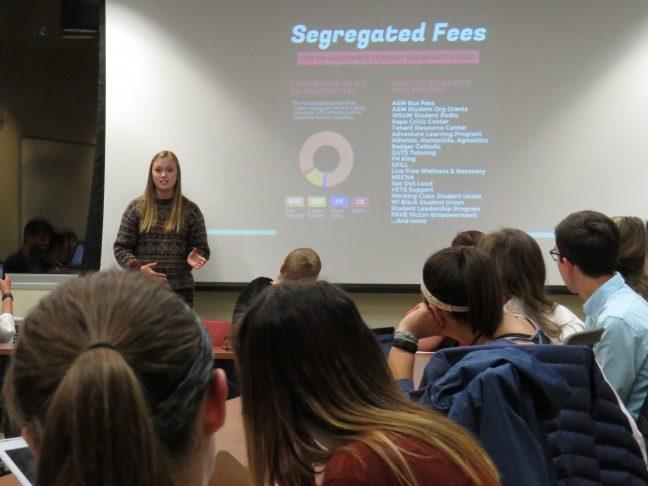University of Wisconsin students considered what a future with reduced segregated fees would look like in light of a proposal in the Wisconsin state budget.
In Gov. Scott Walker’s education-focused state budget address delivered Feb. 8, the governor included a proposal to allow students to opt out of paying segregated fees, which the Student Service Finance Committee allocate to student groups and services.
Nonallocable fees for long-term fixed financial obligations, operating costs, student unions, health care, child care and recreational sports would remain unchanged, according to the state budget brief. But allocable fees for student organizations and activities would be subject to change.
“Allowing an opt-out helps students make the decisions on what they do and do not want to fund,” according to a statement from Walker’s office.
Nonallocable fees amount to $518.58 per student each semester and allocable fees total $88.98 per semester, according to data from the Associated Students of Madison. These allocable fees have increased .014 percent in the past 10 years when adjusted for inflation.
Both the UW System and UW Chancellor Rebecca Blank have praised the budget’s investments in the System, though they did not immediately directly comment on the proposal for changing segregated fees.
“There are a number of policy proposals included in the governor’s budget proposal as well that we will review to determine the impact on our campus,” Blank said in a statement Feb. 7.
"The UW System feels very positive about @GovWalker's budget proposal announced yesterday, which he previewed at @UWLaCrosse." #wibudget pic.twitter.com/yNVnfjDuoY
— Universities of Wisconsin (@UniversitiesWI) February 9, 2017
Dean of Students Lori Berquam urged the Joint Finance Committee to remove the provision from the budget in a letter.
“Changing the nature of our student segregated fee structure would have a significant impact on a number of important services and programs such as transportation, health, sexual assault prevention, veterans support, along with student leadership training,” Berquam said.
Since the announcement, students and legislators have raised concerns about how opting out could affect the UW campus. The General Student Services Fund, which is supplied by allocable segregated fees, facilitates the budgets of 16 different student organizations and programs.

Rep. Chris Taylor, D-Madison, said immediately after hearing Walker’s state budget address she was “very concerned” about the segregated fees proposal.
“We heard today that this could impact access to health services for sexual assault survivors and things that are very, very alarming,” Taylor said.
Taylor said being able to be part of a university community and being able to partake of the various, diverse range of clubs and other activities offered on campus is part of being a student.
SSFC Vice Chair David Morel said he could see enough people opting out that funding would become insufficient and some organizations would lose funding, leaving a student government with power in name only.
“The biggest thing is that you’re going to lose the advocacy that currently ASM can afford these students,” Morel said.
SSFC Rep. Brooke Evans said groups working with underrepresented communities such as Wunk Sheek could struggle because students at a predominantly white institution may not want to pay for services they don’t utilize. Evans said the point of SSFC is to fund programs and services not already provided by the university.
Paid student government positions would likely dwindle as well and present equity issues, Evans said.
“That means a lot of the students who can participate in student government are students with means, and students like me would not be able to participate,” Evans said.
Morel said the free bus pass program would also have to go as well once the contract with Madison Metro expired, also eliminating “critical” bus routes for disabled students.
Rep. Denzel Bibbs said he is particularly concerned about students who rely on the bus pass program to go to work, making the loss “detrimental” for low-income students without other modes of transportation.
Evans said overall the effect of opting out would be saving a few hundred dollars for students with means while making other services “overwhelmingly more expensive” for low-income students.
Approximately 40 students from differing groups, some who identified themselves simply as concerned students, met Monday at the Student Activity Center to understand issues with the proposal and strategize lobbying efforts against opting out as the Joint Finance Committee considers the governor’s budget.
ASM Legislative Affairs Committee Chair Sally Rohrer said Walker’s budget challenges the percent of fees students completely control.
“At the end of the day, it’s going to be less money in the pot,” Rohrer said.
Campus Funding adviser Jack Meischen said if fees were no longer mandatory, student government would no longer be required to abide by viewpoint neutrality, an issue dwindling funds could potentially exacerbate.
Atheists, Humanists, & Agnostics President Nicole Niebler said the proposal could potentially impact the group in multiple ways, from programming to employment to losing viewpoint neutrality in its funding.
ASM’s current GSSF Comprehensive Guide describes viewpoint neutrality as the “most fundamental rule in SSFC decision-making” by a mandate from the U.S. Supreme Court’s.
“In simple terms, it is not the role of the committee to challenge or affirm a group’s overall philosophy, but to provide a space where groups with widely divergent outlooks can interact and contribute to campus life,” according to the guide.
Niebler said AHA would likely receive less funding without viewpoint neutrality, considering it is viewed as contentious.
“What we need to be doing as a university is educating people on a wholesome basis,” Niebler said.
The students in attendance made plans to lobby Wisconsin senators and representatives and to meet again in two weeks.


